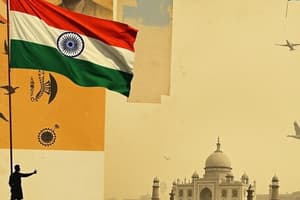Podcast
Questions and Answers
Which major event in 1857 significantly influenced the British perception of Muslims in the Indian subcontinent?
Which major event in 1857 significantly influenced the British perception of Muslims in the Indian subcontinent?
- Partition of Bengal
- Formation of the Indian National Congress
- The Jallianwala Bagh Massacre
- The First War of Independence (correct)
What was a key economic resource that, when transferred to British and Hindu elites, left many Muslims economically deprived?
What was a key economic resource that, when transferred to British and Hindu elites, left many Muslims economically deprived?
- Commercial patents
- Textile manufacturing
- Mineral resources
- Land ownership (correct)
How did the British view Muslims with respect to the War of Independence in 1857?
How did the British view Muslims with respect to the War of Independence in 1857?
- As unwilling participants
- As external invaders
- As neutral observers
- As primary instigators (correct)
Which factor significantly influenced economic prospects for Muslims during British colonial rule?
Which factor significantly influenced economic prospects for Muslims during British colonial rule?
What was one of the effects of discrimination in the workplace on Muslims in British India?
What was one of the effects of discrimination in the workplace on Muslims in British India?
What economic disadvantage did many Muslims face in areas with predominantly agricultural economies?
What economic disadvantage did many Muslims face in areas with predominantly agricultural economies?
Why were Muslims disadvantaged in competing for skilled occupations during the colonial period?
Why were Muslims disadvantaged in competing for skilled occupations during the colonial period?
Why did Muslims experience a deterioration in their economic status after the War of Independence in 1857?
Why did Muslims experience a deterioration in their economic status after the War of Independence in 1857?
Which group primarily controlled land ownership in colonial India?
Which group primarily controlled land ownership in colonial India?
Which of the following was NOT a consequence faced by Muslims during British colonial rule?
Which of the following was NOT a consequence faced by Muslims during British colonial rule?
Flashcards are hidden until you start studying
Study Notes
Economic Disparities Faced by Muslims during British Colonial Rule
- Indian subcontinent was under British colonial control from mid-18th century until 1947, which led to numerous hurdles and disadvantages for Muslims as a religious minority.
Economic Status of Muslims
- Muslims experienced a deterioration in their economic status, particularly after 1857.
- The British were hostile towards Muslims, economically oppressing and disregarding them, as they were convinced that Muslims were the main reason for the War of Independence in 1857.
Land Ownership Disparities
- Land ownership was a critical economic resource in colonial India, but Muslims experienced considerable discrepancies in land ownership.
- In predominantly agricultural economies, many Muslims were landless laborers with Hindus or British landlords holding the majority of land.
- Land ownership disparities resulted in economic inequality.
Education Disparities
- Muslims, particularly those in rural areas, had restricted access to contemporary education during the colonial period.
- Their lack of education hindered their ability to compete for skilled occupations and access economic prospects, exacerbating economic inequities.
Discrimination in the Workplace
- Discrimination in the workplace was pervasive in British India, affecting many Muslims.
- This discrimination further limited their economic opportunities and prospects.
Studying That Suits You
Use AI to generate personalized quizzes and flashcards to suit your learning preferences.




